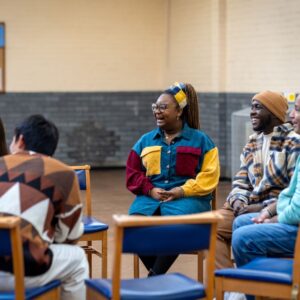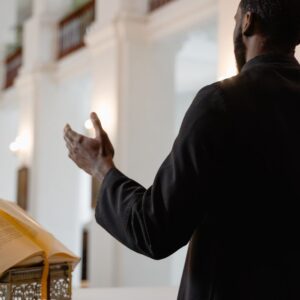Faith in Action: Responding to Injustice
“He has shown you, O mortal, what is good. And what does the Lord require of you? To act justly and to love mercy and to walk humbly with your God.” – Micah 6:8
As a church or ministry leader, you stand at a pivotal moment in history.
The challenges facing our communities, including racial injustice, economic inequality, environmental degradation, and the marginalization of vulnerable populations, demand more than passive concern. They require the transformative power of faith in action.
Your voice, your leadership, and your community’s engagement are not just helpful additions to the work of justice. They are essential elements that history has shown can change the world.
Faith: The Bedrock of Lasting Justice
Too often, action for action’s sake falls short of creating lasting change. Without a deep, foundational belief that every person is created in the divine image, our efforts can become shallow and ineffective. But as people of faith, we are called to something greater. We understand that we are all interconnected parts of a sacred community, and when one suffers, it affects everyone, whether we recognize it or not.
This divine connection gives us a profound reason to advocate for justice. Our faith provides the moral foundation that sustains us through long struggles and gives weight to our work. When we see injustice, we don’t see mere political or social problems; we see violations of God’s intent for human flourishing.
As theologian Willie Jennings reminds us, “We who follow Jesus are working in wounds, working with wounds, and working through wounds.”¹
This profound insight captures the reality that justice work is not about achieving perfection but about engaging faithfully with the brokenness around us. Our faith demands that we see salvation as both personal and communal, both spiritual and social.
Justice as Love in Action
As followers of Christ called to love one another, justice becomes the natural manifestation of that love. It’s not an abstract concept or political talking point. Justice is love made visible in systems, policies, and practices that protect the vulnerable and ensure everyone has the opportunity to thrive.
When Jesus spoke of loving our neighbors, he wasn’t suggesting polite neighborliness. He was calling us to pursue the conditions that allow all people to experience the abundant life he promised.
Justice work is love work, and love work is the work of the Gospel.
Liberation theologian Gustavo Gutierrez understood this deeply. He wrote, “We have been made by love and for love. Only by loving can we fulfill ourselves as persons; that is, [by responding] to the initiative taken by God’s love.”² We do not merit God’s love. This gratuitous love leads us to see that “to make an option for the poor is to make an option for Jesus.”³
The preferential option for the poor is much more than showing concern about poverty—it is recognizing where God’s heart lies and aligning our hearts accordingly.
Faith Embraces Doubt, Outrage, and the Hard Truth
Let’s be clear: faith is not the absence of doubt, outrage, or disgust with injustice. A distorted view of faith promotes a shallow optimism that says “everything will be alright in the end” while ignoring present suffering. This mentality allows us to retreat into comfortable shells, biding our time while waiting for a future hope that excuses present inaction.
True faith acknowledges the painful realities of our world while refusing to accept them as permanent.
It feels the weight of injustice and responds with both lament and action. Your frustration with systemic racism, your anger at economic policies that harm the poor, your grief over environmental destruction – these are not signs of weak faith but of prophetic calling.
Confronting the Church’s Complicated History
We cannot speak honestly about faith and justice without acknowledging the church’s complex relationship with these issues. While we wish we could say the church has always stood as a beacon of justice, history tells a different story. The Crusades, colonialism, witch hunts, advocacy for slavery, support for Jim Crow and segregation are just a few examples of how the church has sometimes been the perpetrator of injustice rather than its remedy.
Even today, there are those who profess faith in Christ but are filled with hate. They cherry-pick sections of the Bible to justify their actions and cause destruction in the lives of immigrants, LGBTQ+ individuals, and many vulnerable and marginalized people groups. This reality has caused many to shrink back from organized religion and even turn their backs on God altogether.
James Cone powerfully tells us that, “Any theology that is indifferent to the theme of liberation is not Christian theology.”⁴
This history is not a reason for despair but for humility and renewed commitment. It reminds us that faith without justice is incomplete, and that we must constantly examine our own hearts and institutions to ensure we are living up to the Gospel we proclaim.
Faith-Rooted Movements That Changed the World
Despite these failures, history also shows us the incredible power of faith-based movements for justice.
The abolitionist movement against slavery in the 1800s was deeply rooted in faith, with religious women like Quaker Minister Lucretia Mott leveraging their faith and gender as powerful advocates. The civil rights movement of the mid-20th century was, to a considerable degree, a religious revolution whose social and spiritual impact inspired numerous other movements around the world.
Martin Luther King Jr. challenged the interracial wrongs of his country without a gun, and he had the faith to believe that he would win the battle for social justice. The movement was sustained by the religious power unlocked within southern black churches and combined the social gospel and black church traditions, infused with Gandhian notions of active resistance and “soul force”.
James Cone, often called the father of Black liberation theology, understood this connection clearly when he writes that liberation “is not an afterthought, but the very essence of divine activity.”⁵
Liberation theologian Ada María Isasi-Díaz, founder of mujerista theology, understood that “struggling for justice is a liberative praxis. This means that it is an activity both intentional and reflective; it is a communal praxis that feeds on the realization that Christ is among us when we strive the live the gospel message of justice and peace.”⁶ For Isasi-Díaz, drawing closer to God and struggling for justice became “one and the same thing.”
These movements succeeded not despite their faith, but because of it. Faith provided the moral framework, the sustaining hope, and the community bonds necessary to endure long struggles and create lasting change.
Your Historic Opportunity
We are all living and leading in an historic moment, and the challenges we face today require the same kind of faith-rooted leadership that changed the world in previous generations.
Your community is uniquely positioned to make a difference right where you are. Jennings reminds us that our faith must grapple with how “race and place are two sides of the same coin.”⁷ Historically, there was a deep connection between place and personal identity, but once people were stripped of their identity with the land, race became a way to identify and separate people. Until we reckon with the fact that racial identity was substituted for place-centered identity, the power of race will remain an ever-renewing force with each generation.
As people of faith, we are called to recognize that our struggle must be both personal and systemic, both spiritual and political. This theological insight challenges us to stand in solidarity with all who are marginalized, regardless of our own identity markers.
Take Action: Five Essential Steps for Faith Leaders
1. Educate Your Community on Justice as Gospel
Help your congregation understand that justice work is not a political add-on to faith but integral to following Jesus. Preach, teach, and discuss how biblical texts call us to care for the vulnerable, welcome the stranger, and work for systemic change.
2. Build Authentic Relationships Across Difference
Move beyond charity to solidarity by developing genuine relationships with communities most affected by injustice. Listen to their experiences, follow their leadership, and use your platform to amplify their voices rather than speaking for them.
3. Engage in Policy Advocacy
Use your voice to influence legislation and policies that affect the vulnerable. Write letters to elected officials, organize meetings with representatives, and mobilize your congregation to participate in the democratic process as an expression of their faith.
4. Address Injustice Within Your Own Institution
Examine your church’s hiring practices, leadership structure, and resource allocation. Ensure your community reflects the inclusive love of Christ and provides opportunities for all people to participate fully in leadership and decision-making.
5. Partner with Established Justice Organizations
Don’t reinvent the wheel. Connect with organizations that have been doing this work effectively and learn how your community can support and collaborate with existing efforts for maximum impact.
Organizations for Partnership and Learning
Here are ten established organizations where you can find resources, training, and partnership opportunities to engage your church in justice work:
- Sojourners – https://sojo.net/ Faith in action for social justice with advocacy, education, and mobilization resources
- Bread for the World – https://www.bread.org/ Christian advocacy organization focused on ending hunger through policy change
- NETWORK Lobby for Catholic Social Justice – https://networklobby.org/ Faith-based political advocacy prioritizing racial equity and economic justice
- Christians for Social Action – https://christiansforsocialaction.org/ Scholar-activists connecting faith and justice with practical tools for engagement
- JustFaith Ministries – https://justfaith.org/ Small group programs and resources for faith-based justice education and action
- Justice Revival – https://justicerevival.org/ Christian human rights organization with education and advocacy resources
- Interfaith Worker Justice – https://www.iwj.org/ Multi-faith network organizing religious communities on worker rights and economic justice
- The Episcopal Church Office of Government Relations – https://www.episcopalchurch.org/ministries/social-justice-advocacy-engagement/ Resources for faith-based advocacy and protest participation
- Call to Action – https://cta-usa.org/ Independent Catholic organization promoting social justice and church reform
- Faith in Action – https://faithinaction.org/ National network of faith-based community organizations working for systemic change
The Time Is Now
The moment demands nothing less than the full engagement of faith communities in the work of justice. Your voice carries weight. Your community has power. Your faith provides both the motivation and the sustaining hope necessary for the long work ahead.
The question is not whether you have a role to play in this historic moment, but whether you will embrace that role with the courage and conviction your faith demands.
How Center for Transforming Engagement can help you lead in trying times
As leaders, it’s crucial your learn how to navigate complicated scenarios and learn to tend to your own soul, all while continuing to bring a message of hope.
That’s why we’ll be hosting a virtual summit this September – Leading in Politically Polarizing Times – and we welcome you to join us.
This 2-day summit will guide leaders on how to tackle feelings of fear and uncertainty, and will open up meaningful conversations about applying our faith in the community in difficult times. We’ll cover topics ranging from the church’s role in social justice to mental health and emotional resilience, empowering lay leaders to engaging with different faith perspectives. And we’ll discuss all with the intent to give you the clarity and courage you need to face injustice as a church leader.
The summit is over but you can purchase the video sessions here.
Sources
- Willie James Jennings, Acts: A Theological Commentary on the Bible (Westminster John Knox Press, 2017)
- Gustavo Gutiérrez, quoted in John Dear, “Gustavo Gutierrez and the preferential option for the poor,” National Catholic Reporter, November 9, 2011.
- James H. Cone, A Black Theology of Liberation (Orbis Books, 1990).
- Ada María Isasi-Díaz, Mujerista Theology: A Theology for the Twenty-First Century (Orbis Books, 1996).
- Willie James Jennings, “Eco-Theology and Zoning Meetings: An Interview with Willie Jennings,” Reflections, Yale Divinity School. Based on biographical information, this interview likely occurred after his 2015 appointment to Yale faculty.










0 Comments